

Regulatory Bias and Unseen Harms. Our medical system exhibits a systematic bias whereby erroneously allowing a harmful treatment is seen as much more morally significant (and important to avoid) than is erroneously withholding a beneficial treatment, regardless of which kind of error is actually likely to result in a greater amount of avoidable human misery and suffering.
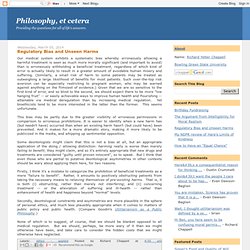
(Similarly, a small risk of harm to some patients may be treated as outweighing a large likelihood of benefits for most patients. Such over-the-top risk aversion can be especially restricting to pregnant women, who may be warned against anything on the flimsiest of evidence.) Given that we are so sensitive to the first kind of error, and so blind to the second, we should expect there to be more "low hanging fruit" -- or easily achievable ways to improve human health and flourishing -- attainable via medical deregulation than by increasing medical regulation.
Authors. The Correspondence between Princess Elisabeth of Bohemia and Rene Descartes. On the Liberty of the Ancients Compared with that of the Moderns - Benjamin Constant. [This lecture was given by the Swiss-French thinker Benjamin Constant in 1819.
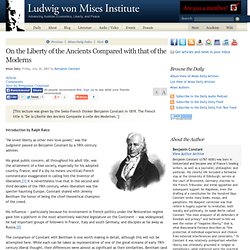
The French title is "De la Liberté des Anciens Comparée à celle des Modernes. "] Nietzsche & Germany. Nietzsche Stefan Sorgner on Nietzsche’s still-controversial influence in the land of his birth.
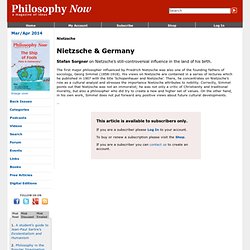
Did Peter Unger just get it wrong? Bibliography on Medieval Jewish Philosophy.
Philosophy: Free Courses. Get free Philosophy courses from the world’s leading universities.
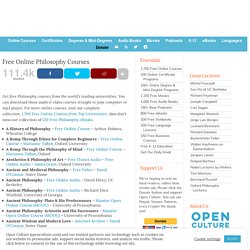
You can download these audio & video courses straight to your computer or mp3 player. For more online courses, visit our complete collection, 1,700 Free Online Courses from Top Universities. For a full lineup of online courses, please visit our complete collection, 1,700 Free Online Courses from Top Universities For a complete list of online courses, please visit our complete collection, 1,700 Free Online Courses from Top Universities. For a list of online certificate programs, visit 200 Online Certificate & Microcredential Programs from Leading Universities & Companies, which features programs from our partners Coursera, Udacity, FutureLearn and edX. And if you’re interested in Online Mini-Masters and Master’s Degrees programs from universities, see our collection: Online Degrees & Mini Degrees: Explore Masters, Mini Masters, Bachelors & Mini Bachelors from Top Universities.
24.200 Ancient Philosophy, Fall 2004. Judith Butler: Part 2/6. Talmudical hermeneutics. Talmudical hermeneutics (Hebrew: approximately, מידות שהתורה נדרשת בהן) is the science which defines the rules and methods for the investigation and exact determination of the meaning of the Scriptures, both legal and historical.

Since the halakha, however, is regarded simply as an exposition and explanation of the Torah, Talmud hermeneutics includes also the rules by which the requirements of the oral law are derived from and established by the written law. These rules relate to: Classes of rules[edit] Endangered Languages Project. Northern Institute of Philosophy. Ever wondered what it's like to be a philosopher nowadays or why philosophers do what they do?

Philosophers on Film is a series of brief video interviews with philosophers who visit NIP. CfA: Summer School in Tuebingen on Einstein’s Philosophy of Science, with Don Howard « Analytic Philosophy. Should You Kill The Fat Man? Jeremy Stangroom. God knows why, but I’m still pondering issues of consent (though why what follows is relevant in this respect might not be immediately clear).
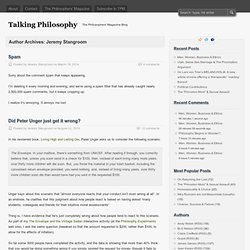
The Trolley Problem from Jeremy Stangroom. Jeremy Stangroom posted a link on philosop-l to his site, where he has given 4 problems interactive electronic versions.

I’m using a link here to all 4 problems, but I’ve only looked at the trolley problem. It seems to me very well done, but that’s not quite what we’re going on to look at. Experimental Philosophy and the Straw Man Problem – Early Modern Experimental Philosophy, University of Otago, New Zealand. Peter Anstey writes … One common objection against the experimental–speculative distinction (ESD) as an alternative historiographical framework for understanding early modern philosophy is the Straw Man Problem. Our interlocutors are prepared to admit the importance of the emergence of the experimental philosophy in Britain in the mid-seventeenth century and its subsequent uptake across the Continent.
However, they object that, in spite of all the experimental philosophers’ rhetoric, there were few, if any, speculative philosophers. The speculative philosopher, in their view, is merely a straw man, a creation of the experimental philosophers who needed someone or something to define themselves against. Poiεsis. The Google-Trolley Problem. As you probably recall, the trolley problem concerns a moral dilemma.

You observe an out-of-control trolley hurtling towards five people who w ill surely die if hit by the trolley. You can throw a switch and divert the trolley down a side track saving the five but with certainty killing an innocent bystander. There is no opportunity to warn or otherwise avoid the disaster. Do you throw the switch? A second version is where you stand on a bridge with a fat man. I want to ask a different question. A Philosophy Podcast and Philosophy Blog. More Intelligent Life - StumbleUpon. Masterymistery/flickr.

Is–ought problem. The is–ought problem in meta-ethics as articulated by Scottish philosopher and historian David Hume (1711–76) is that many writers make claims about what ought to be on the basis of statements about what is. However, Hume found that there seems to be a significant difference between descriptive statements (about what is) and prescriptive or normative statements (about what ought to be), and it is not obvious how one can get from making descriptive statements to prescriptive. The is–ought problem is also known as Hume's law and Hume's Guillotine. A similar though distinct view is defended by G. E. Thou shalt not commit logical fallacies.
Legal theory / philosophie du droit. A magazine of ideas. Nachtstudio - Bayern 2 - Download, MP3, Video. Oe1.ORF.at Wissen. Mittwoch10. November 201019:06. Information Philosophie - Die Zukunft Philosophischer Praxis. HOHE LUFT » Philosophie-Zeitschrift für alle, die Lust am denken haben. Www.hoheluft-magazin.de/wp-content/uploads/2013/02/HL0213_Hegel.pdf. Philosophy bites. Philosophy Bites. Philosophy Pages. Was Wittgenstein Right?
Continuum Philosophy News. Prolegomena. Non-academic philosophers « Noumenal Realm. Lets just take the view, for matters of assumption, that proper philosophy is the kind done within the university setting, with the rigour of possessing a PhD, or higher doctorate, around similar peers who are able to keep track on them, and criticise and correct their mistakes; or encourage certain ‘familial values’. So, what contrasts from this notion of a philosopher as academic; well, two kinds of people. 1. Academic non-analytic ‘philosophers’2. Non-academic ‘philosophers’ Karl Popper's "Introduction to the Logic of Science"
Simon Caney, 2005. ‘Justice Beyond Borders – A Global Political Theory.’ The first thing I noticed and was slightly confused by in this reading was Caney’s discussion of cultural cosmopolitanism. It seemed to me that cultural cosmopolitanism is very similar to some strands of multiculturalism, which endorse a mixed society because of the benefits it will bring to those already in that society. An argument against this view could highlight the Kantian-style problems when attempting to improve ones own society by using the cultures of others. The main problem, though, seemed to me to be the apparent contradiction in cultural cosmopolitanism. Social Contract Theory Social contract theory, nearly as old as philosophy itself, is the view that persons’ moral and/or political obligations are dependent upon a contract or agreement among them to form the society in which they live.
Socrates uses something quite like a social contract argument to explain to Crito why he must remain in prison and accept the death penalty. However, social contract theory is rightly associated with modern moral and political theory and is given its first full exposition and defense by Thomas Hobbes. After Hobbes, John Locke and Jean-Jacques Rousseau are the best known proponents of this enormously influential theory, which has been one of the most dominant theories within moral and political theory throughout the history of the modern West. In the twentieth century, moral and political theory regained philosophical momentum as a result of John Rawls’ Kantian version of social contract theory, and was followed by new analyses of the subject by David Gauthier and others.
Philosophiert über Wirtschaft und Wirtschaftswissenschaft. Romanticism and Realism, The Enlightenment and Industrial Revolution - Aesthetics - Objectivism Online Forum. CARP.